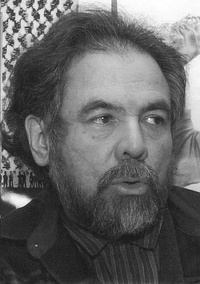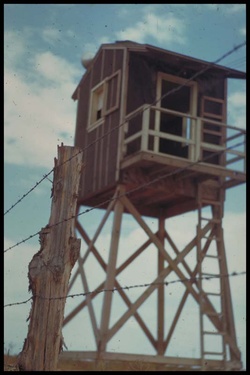Read Part 2 >>
How many other “Farouks” are still being detained?
One of the horrible and destructive aspects of ICE is its lack of public accountability, so it doesn’t release statistics on how long detainees are in prison. But during the Bush administration some numbers were given to me by Jane that had been leaked somehow (which I can’t find now), and I seem to remember there was 6,000-7,000 detained longer than six months, many of them for years. Under Obama, the annual number of detentions has increased, so that number could be higher.
(*Farouk had been convicted of crimes in previous years, including resisting arrest and a domestic dispute, so to say he was “never charged with a crime” is a bit misleading. Like thousands of other post-9/11 detainees Farouk was not being held on a criminal charge in the detention shown in the film.)
Did making this film place you under any kind of suspicion by Homeland Security?
The documentary Enemy Alien was investigated by the counterterrorism office of New Jersey, and I was questioned by FBI and counterterrorism officials. Farouk’s son Tarek was arrested on a questionable pretext and questioned about terrorism.
The message of your film for me is that should there be a perceived need to do so ever again that the US government has the power to repeat what it did to Japanese Americans during WW2.
Even though the types of targeted detention that swept up thousands of Arabs, South Asians, and Muslims in the years after 9/11 aren’t happening the same way, immigration detention overall now dwarfs what it was right after 9/11, going from 165,168 in 2002 to just under 400,000 under Obama.
Once I’ve looked at the larger picture it’s clear the injustice really doesn’t affect only one community at a time. It’s a question of what we fear is going to “happen again.”
Could internment ever happen again?
There’s racialized and politicized forms of detention that increase following a “national security crisis,” like we saw after Pearl Harbor and 9/11. But what’s continued and commanded even more resources through today is the surveillance of the Muslim community by Federal and local enforcement agencies. The object of all this surveillance is the deliberate production of fake “terror plots” through the use of informants who infiltrate the community to find and entrap a young confused person, at a cost of hundreds of thousands of dollars. Most cases you’ve heard about recently where there was a “terrorism” conviction were produced that way.
And then always lurking in the background is the heavy-handed policing and prosecution of the Occupy movement, which shows how economic turmoil turns people who oppose income inequality into the new “terrorist threat.” And as the Boycott, Divestment, and Sanctions movement has gained ground, we’ve again seen pro-Palestinian activists hit with “terrorist” branding and prosecution. Last October I sat on a panel with Hatem Abuddayeh of Arab American Action Network who was targeted this way.
How is your film about the Tule Lake Segregation Center going?
I became engrossed in the story of Tule Lake Segregation Center as I was researching the WW2 incarceration for parallels to Farouk’s struggle, and I knew I wanted to do a documentary about it the second I was finished with Enemy Alien. Actually the films are overlapping, since the outreach for the first has become the research and production of the second.
This is really the moment to tell the story of Tule Lake, now that the JA community is finally healed to the point of being able to share it. I think even people who think they know what the WW2 internment was about will be blown away by how out of control and violent the segregation policy was, and the resonance with recent history will be very provocative and visceral without having to mention anything about 9/11 in the film. And the approach I have in mind won’t be like any internment documentary that’s been made before.
What is the timeline for its completion?
I’ve been on the last two Tule Lake Pilgrimages, meeting incarcerees and shooting interviews. I’ve been sending out funding proposals and I plan on having a rough cut to show at the next Tule Lake Pilgrimage in July 2014. I have a short work-in-progress trailer which showed in the San Francisco Films of Remembrance program following the anniversary of Executive Order 9066, and you can see it here: http://vimeo.com/59508984
How familiar are you with the Canadian internment experience?
I know very little about the Canadian internment experience, I’m sorry to say. I’m interested and eager to learn.
Is the “Life or Liberty” (stories of wartime detention and resistance) your personal undertaking? Can you provide some background, please?
Life or Liberty (lifeorliberty.org) is a non-profit project I started in the immediate wake of 9/11 to produce documentaries highlighting the kinds of state-sponsored violence that comprised the domestic “War on Terror” and also to illuminate the historical parallels to these policies. Most importantly though, Life or Liberty projects combine a clear-eyed understanding of these enforcement/incarceration regimes with a focus on community resistance, how people fight back against them. If you go to the website you can see the previous short documentaries I produced leading up to Enemy Alien, the first feature documentary produced under lifeorliberty.org, which is being followed up with the Tule Lake Documentary (working title) now in production.
Given the internment and redress experience of the JA and JC communities do we have a moral obligation to help Muslim communities here?
I’ve found it inspiring how the JA organizations that were involved in the struggle for redress have been very proactive in speaking out against the “national security” profiling of the Muslim, Arab, and South Asian communities. It certainly makes sense; I don’t see how any such group could justify its existence today if it wasn’t at the forefront of upholding for others the same principle of justice it demands for its own community. Someday soon I hope we’ll see broader efforts to secure redress for those detained and tortured in the so-called “War on Terror,” and I expect the JA and JC communities will do all they can to help that succeed.
Watch the trailer for Enemy Alien >>
© 2013 Norm Ibuki







